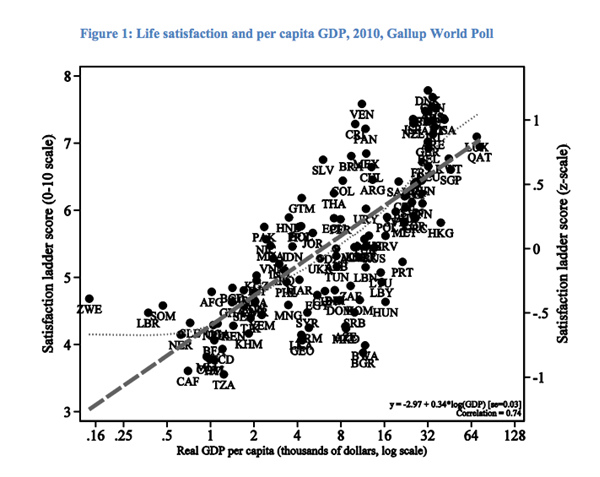“But you know, man, money isn’t everything!” is the 21st-century equivalent of “If they don’t have bread, let them eat cake!” It’s getting kind of annoying.
[REITs]
Q2 hedge fund letters, conference, scoops etc
There are a number of truisms in the world, so here is one: those who say that “money isn’t everything” very likely don’t have any problem with their financial situation whatsoever. Ironically, it seems as if the richer you get, the more you feel the urge to point it out to everyone around you as if having money makes you guilty of something. Most famously, even Bill Gates said that “money isn’t everything.” I believe we’ll agree to disagree.
And of course, only those with a stable income can afford to read the abundance of articles telling us that we ought to care about anything but money, and how millionaires are terribly unhappy. Except for the fact that this is not true. A study entitled “The Amount and Source of Millionaires’ Wealth (Moderately) Predict Their Happiness” and published in the Personality and Social Psychology Bulletin in January this year shows a direct link between leading a happy life and being wealthy. The Harvard Business School researchers found that:
Overall, using two large samples of millionaires with two measures of well-being (happiness in general and life satisfaction), we find consistent evidence that somewhat higher levels of wealth are not associated with higher well-being, but substantially higher levels (greater than $8M in Sample 1, greater than $10M in Sample 2) are linked to modestly greater well-being.
But there’s no need to be a millionaire to experience a considerable improvement in your overall happiness. This 2008 paper documents a visible correlation between absolute income and well-being, stating, “Thus, our evidence is consistent with the view that only absolute income matters to happiness (which would imply that the within- and between-country estimates are identical).” However, the research also points out that not all countries have shown this consistency: in the United States, happiness has not improved significantly in the past decades, despite its economic growth.
Source: Ludwig-Maximilians University’s Center for Economic Studies and IFO Institute
In Europe however, former communist countries have been improving their happiness significantly over the past decades. James Gwartney and Hugo Montesinos’ contribution to the latest edition of the Visio Journal, “25 years after the fall of communism: Eastern European Economies,” reveals that not only is Europe’s East more prosperous, it is also demonstrably happier. The World Values Survey (WVS) asked people: “All things considered, how satisfied are you with your life as a whole these days?”
Respondents answered on a ten-point scale, ranging from dissatisfied (1) to satisfied (10).
Turning to the dummy for former socialist countries, the main effect of this variable is negative (1.358 units) and highly significant. This indicates that during the period of WVS survey wave 3 (1995-1998), holding all else constant, individuals in FS countries were significantly less satisfied with their life than individuals in other countries. However, this effect has been partially mitigated with the passage of time[…].
The facts are in: freedom to innovate, create, and make yourself into something also makes you happier. While it shouldn’t come as a shock to most people, this needs considerable reiteration. As soon as people reach the necessary level of income that makes them feel comfortable, they begin to criticize the ambitions of those attempting to rise up. You won’t hear “money isn’t everything” as much in the Czech Republic, Mexico, or Bangladesh as you will in France, the United States, or Japan.
There is no harm in unapologetically stating that you want to make money. In fact, those criticizing a materialistic mindset should recognize that they have benefited from the work of those who aspire to achieve more. It is their creativity and innovation that everyone benefited from, not the zen attitude of “everything will fall into place.”
Bill Wirtz is a Young Voices Advocate. His work has been featured in several outlets, including Newsweek, Rare, RealClear, CityAM, Le Monde and Le Figaro. He also works as a Policy Analyst for the Consumer Choice Center.
This article was originally published on FEE.org. Read the original article.
![]()


